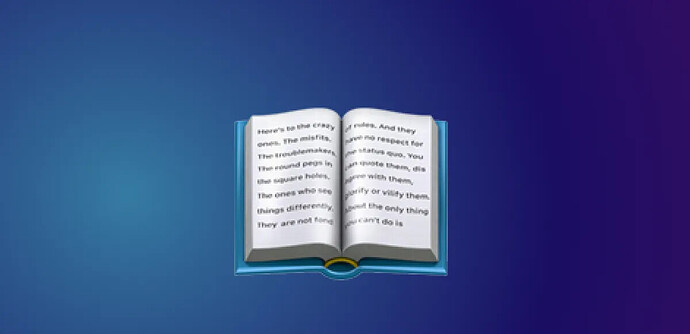This post focuses on the importance of comprehension in information consumption. The quality of comprehension depends on our ability to decode the symbols and understand the information presented. This ability is influenced by our knowledge of various sign systems (ontologies) and the intersection between them and the information received. Without a connection between our prior knowledge and the new information, its meaning will not be fully perceived. This is applicable regardless of the method of obtaining information, whether it be through a work of art, a foreign language, or a new concept in our native language. If there is no connection, the information will not leave a lasting impression in our memory.
While reading we:
- decode symbols
- create meaning and consequences
While there are various ways to consume information, such as listening to a book, reading remains the most effective tool for developing critical thinking and reasoning skills. It involves transforming letters into words and sentences, where symbols are deciphered into familiar meanings. The quality of our reasoning is influenced by numerous related factors.
There is always a person between a book and a person
A crucial factor in selecting a source of information lies in the intermediary between the book and the reader. By honing our critical thinking skills and being discerning with the information we find on the internet through fact-checking and relying on verified authors, we can effectively filter out irrelevant and unhelpful information. However, the ultimate deciding factor in our choice of source may come from a trusted individual, such as a mentor, authority figure, or teacher who understands our learning style and can provide personalized recommendations. Their guidance holds significant weight in our intellectual growth and development.
We are not aware of our ignorance
In today’s fast-paced, technology-driven world, we are constantly bombarded with information from various sources. However, our limited ability to process and integrate this information leads to a fragmented and incomplete understanding. Despite our confidence in this knowledge, it fails to provide a comprehensive perspective, hindering our ability to make complex decisions and understand the bigger picture. To address this issue, we can seek out books that provide a more structured and focused approach to knowledge and help us integrate new information into our existing context.
You don’t have to finish the book
Our reading style is influenced by the purpose behind it. When seeking self-education and a desire to integrate new information into existing knowledge, following a structured reading approach is crucial.
Introduction to the book. The way we approach reading is heavily influenced by our underlying intentions. If our goal is to broaden our understanding and incorporate new information into our existing knowledge base, it’s crucial to adopt a structured approach to reading.
Main and subordinate. When it comes to information, we prioritize the main points and only delve into the details when necessary. At the moment, we don’t require every detail from a book, a few chapters may suffice for our needs as we focus on the essential elements.
Sequence and structure. All literary and non-fictional texts are stories, woven together by the author’s narrative logic. This logic guides us through the narrative’s progression and links the past to the future, connecting causes with consequences
Analysis and synthesis. By establishing a shared comprehension, beginning with the overarching reasoning, and emphasizing the central aspect, we delve into the themes and concepts within the book. We create links between them, constructing our own interpretations based on these connections. We then integrate them into the necessary context, synthesizing fresh ideas and connections in the process.
Visualization and schematization. At this stage, we formalize what we’ve read by transferring our thoughts and understanding from our mind to an external form. This can be done through creating a mind-map, organizing concepts into tables, or using method thinking through writing. This process of externalizing our thoughts helps solidify our understanding and allows for the possibility of receiving feedback and clarifying our perspectives by sharing our insights in a public space like a blog or social media platform.
Addition of experience. By physically experiencing what we read about, such as through studying memoirs, we enhance the visual images in our mind and reinforce them with other sensory elements as we virtually journey through the author’s life.
Oral conversation. When we engage in discussions and debates about ideas, we not only expand our knowledge but also reinforce it through the creation of new neural connections in our brain. Despite potential awkwardness or criticism for sounding scripted, speaking about unfamiliar topics is a valuable way to add weight to our understanding of them.
Repetition delayed in time. It’s not always easy to grasp a new idea at first glance. It may require reading the text multiple times, either right after finishing the passage or even after a gap of a few years. The number of readings needed depends on factors such as the complexity of the text, personal need, and prior understanding of related concepts. Revisiting previously covered material is a useful way to gauge personal growth
Practical use. For reading to be effective and the knowledge gained to be practical, it’s crucial to engage with meaningful information. Our understanding of the world is shaped by new knowledge, which in turn informs our behavior at various levels — personal, within our families, in our professional and social circles, and as members of society. The extent of our impact on these levels is determined by our knowledge and perspectives.
Every knowledge must be project-based
Working with each new book expands both our special (project) knowledge and our horizons. This is achieved through careful, metacognitive reading and a meaningful approach to all activities. Success is not determined by the quantity of books read, but by the depth of understanding. As we gain new knowledge and insights, we grow and develop into our true selves.
